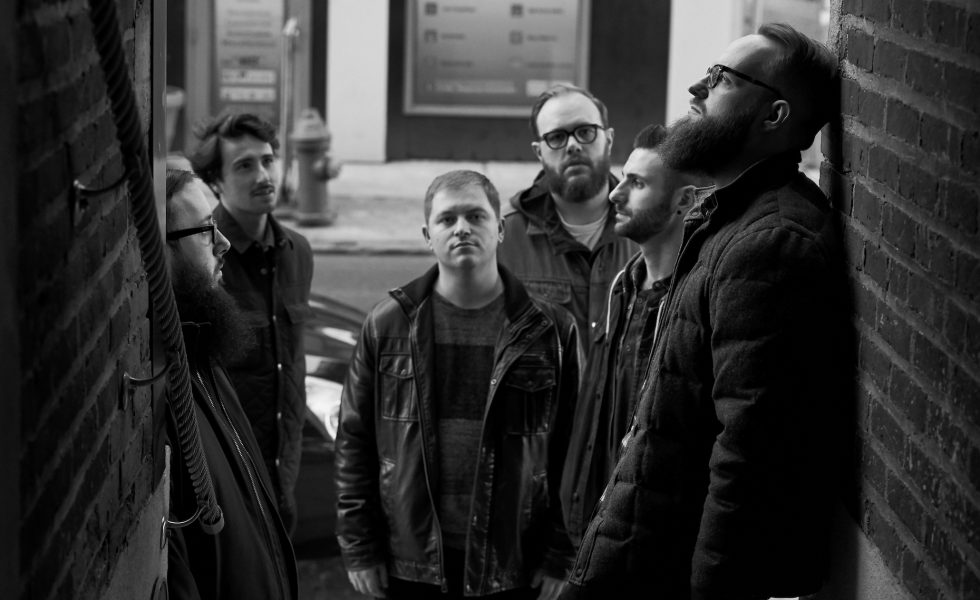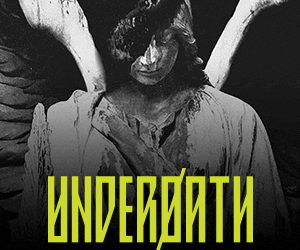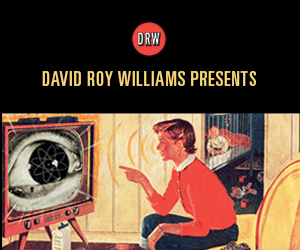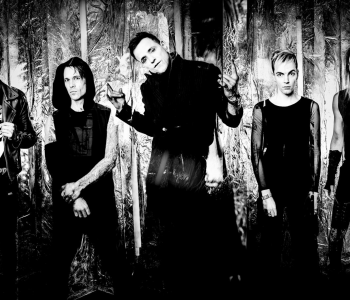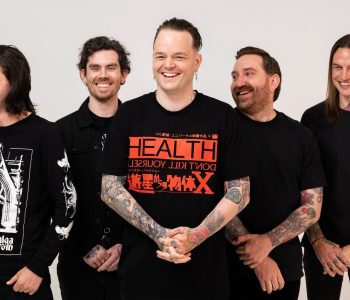Korn‘s Jonathan Davis was so excited by ORGY that he created his own record label …
When I was 17, my best friend was an American girl named Carla. We’d spend hours Skyping each other about memes, our raging obsessions with Panic! At The Disco and all the cute little oddities in our families’ cultures.
Though we lived a solid 15,460 kilometres apart, it only ever felt like we were a street or two removed. Skype had excised the boundaries that kept realtime contact impractical, and I learnt quickly that, despite our vastly different backgrounds, our personalities weren’t all that incompatible. If it weren’t for a thick, inimitable accent, I’d’ve believed we could bump into each other at a Soundwave.
MORE: Dead Of Winter Festival Drop Mammoth Second Line-Up Announcement // Underoath: Soul Remover // Cosmic Psychos: Cracking Cold Ones With The Pub Rock Kings
I haven’t actually used Skype since Carla and I fell out of touch, but midway through a FaceTime call with Dan “Soupy” Campbell (which is similar enough, right?), that same feeling of connectedness strikes. We’re both lying in bed—cameras placed at that awkward angle where both of us look like slugs—except he’s in Philadelphia, and I’m in Sydney. 31,800km apart, give or take. We’re vibing on what’s likely the most universal bonding tool, music, and there’s no hiccup in formality when it comes to conveying an emotion. Except for the fact that he’s wildly famous, and the most public attention I ever got was when I choked on spit during a ninth grade debating tournament, Campbell and I aren’t so different.
It’s fitting: distance, or the lack thereof, is a prevalent theme explored on Sister Cities—the sixth album from Campbell’s band, The Wonder Years. The record takes listeners on a two-year journey chronicling the restless world tour that followed the pop-punk powerhouse’s 2015 opus, No Closer To Heaven. Love, loss, anxiety and isolation are contemplated from shaky airplane seats and under arches made of driftwood. But the separation that Campbell felt isn’t all desolate—the frontman is quick to assert that Sister Cities has a positive undertone amidst its turbulence; the record taps “not so much [into] the concept of distance, but the concept of … Elsewhereness.”
When you don’t get to travel very far, your worldview doesn’t expand much, and it becomes very difficult to expand it or to understand other people.
[ Dan Campbell ]
“It’s the concept of always being apart from what’s happening in the world,” he rhapsodises. “Always being away from home and viewing the things that you’re going through through the lens of a foreign place. I think it’s a powerful thing because when we were out on our last tour, we were finding people that commiserated with us and commiserated with our emotions in places all over the world.”
Such is an observation that rivals a common taught belief, that Earth is a discordant stew of cultures all discrepant and cutthroat.
“Everyone that I know grew up with this understanding that the world is so big,” Campbell continues, “That it’s such a massive place with all these other cultures that have nothing to do with your own. We’re told to look at how crazy and different everything is in Japan or Brazil, and especially recently, there’s been this divisiveness that says, ‘These people are your enemy. They’re what’s hurting you and your people.’ And what we’ve always known, but came to see in a very broad light, was that those people aren’t actually all that different to us. Mostly, people are kind. Most people love the way that you love and lose the way that you lose. Those big, arching life experiences you have go right across cultures.”
Though not a political album on any wavelength, Sister Cities is distinctly relevant. In a time where cultural tension is the norm and communities are routinely oppressed for even minute disparities (thanks in no short part to the right-wing shitstorm currently unfurling at the hands of the American government), the record’s themes of harmony and kinship are especially poignant. It’s not outlandish to envision a punter born of intolerance stumbling upon a copy of Sister Cities, soaking in its inflictions of unity and considering that, hey, maybe people of colour aren’t aliens after all. Campbell is similarly optimistic about the potential impact of the record.
“I’m from Philadelphia,” he says, “And until I was 18 years old, the furthest I’d ever been from home—except for the one time that I went to North Carolina—was about an hour and a half away to the Jersey Shore, where we went on vacation every summer. When you don’t get to travel very far, your worldview doesn’t expand much, and it becomes very difficult to expand it or to understand other people. It wasn’t until I got to travel through all of these places—through small towns and big cities all across the world—that I was able to feel as connected as I do with other people. If you don’t get to leave your town a lot, or if the rhetoric there is divisive, I hope that we can offer a counterpoint. If all you’re hearing is, ‘these people are your enemy’ and, ‘these people are so different from you, they threaten your way of life,’ I hope that what we can say is, ‘that’s not the only way to look at it.’ That’s the dream scenario for me.”
We were walking to dinner, and there were these stray dogs everywhere, and I kept thinking, ‘you and I are the same right now … we’re both in this place where we’re … not unwanted, but unnoticed … this place is not ours’.
[ Dan Campbell ]
The Wonder Years have been international road dogs since The Upsides dropped in 2010; the sextet have seen a damn lot in their near-decade of journeying, and as such, Campbell says the broader idea of Sister Cities was “always kind of there under the surface.” That idea—a chronicle of the band’s adventures abroad—was an enticing one from day dot, but it took until a dismal landing in Santiago, Chile for a lightbulb to flicker above Campbell’s head. The band were set to make their Chilean debut on August 18th, 2016 at the cozy Club Ambar, before the show was unexpectedly axed. They were moments from boarding the plane over when they found out.
“We were just kind of wandering around the city, and we felt so despondent and out of place,” Campbell says, his timbre defeated like it would’ve been that day. “We weren’t there for a reason anymore—the show was cancelled so it felt like our purpose had been cancelled, and we were just aliens in this foreign city. We were walking to dinner, and there were these stray dogs everywhere, and I kept thinking, ‘you and I are the same right now … we’re both in this place where we’re … not unwanted, but unnoticed … this place is not ours’.”
Alas, there was a silver lining. As it turns out, Chile has a booming DIY punk scene of its own, populated by some notably high-spirited kids who were keen to give The Wonder Years a second shot at tearing shit up.
“When we were at dinner, Campbell continues, “We got a message from these kids that said, ‘You’ve gotta play a show! We were so excited, and we don’t think you’ll ever get the chance to come back here.’ We were like, ‘Well, there’s nothing we can do,’ and they were like, ‘We can do something! We have this rehearsal space with a stage and a PA and a little room. We’ll put all of your gear in these pickup trucks and we’ll take you there!’ I felt immediately taken aback.”
It was then that Campbell related most to the stray dogs, whom he embodies in the title track on Sister Cities. The title itself came later that night.
“We were walking back to our hotel after dinner, and we passed these giant obelisks in the middle of the city,” Campbell says, enthusiasm beaming like a child that’d just discovered the concept of candy. “I read that they were the monuments to the sister cities of Chile, and I started ruminating on the idea that, ‘Well, maybe everywhere is a sister city to everywhere else.’ That was the moment where it all kind of clicked for me.”
Chile is a key locale on Sister Cities, but across a tight 11 tracks, Campbell and co. muse on incidents occurred in all corners of the globe. On opener Raining In Kyoto, we see our hero mourn the passing of his grandfather. The vivid imagery of a soaked Campbell nursing coffee in a can and setting candles out to eulogise set a gloomy tone from the onset, but the rumbling guitars and a swathe of impassioned screams imply more frustration than sadness. It Must Get Lonely places Campbell in a rut traversing Europe, before an optimistic moment comes in a standout cut for local readers especially: the silky, ethereal When The Blue Finally Came.
To bring a documentarian on a world tour when there are six of us in the band … We’d bankrupt ourselves.
[ Dan Campbell ]
It was May 2016 when The Wonder Years hit Australia for a nine-date jaunt that spanned Brisbane to Perth. On a day off mid-tour, the band found themselves cliff-jumping in the pristine waters of Wattamolla, roughly an hour south of Sydney. While most of us would drool at the thought of a day spent rejuvenating by the waterfall and exploring the park’s nature trails, Campbell was preoccupied with anxiety over the main attraction.
“I am famously petrified of heights,” he chuckles, “So I was like, ‘There’s no way I’m jumping off this cliff. It’s just way too fucking big.’ I went down to the bottom, and I swam out and looked at it from the ocean level, and I was like, ‘No way. Noooooo fucking way …’ But then I thought about it and I was like, ‘Y’know what? You should do it. You should do it for the experience and you should do it so you can write about it, and look, look, Michael just did it! You’re going to be fine!’ And so I swam back to the shore, and then I just ran. I ran all the way up the hill, through the parking lot, over the fence and up to the edge, looked down, measured my steps backwards, closed my eyes and ran off the edge. It wasn’t the kind of thing that I would normally have done, but it was a thing that meant a lot to me in that moment.”
Thus led to Campbell immortalising the event in a two-minute prelude to The Orange Grove. “I watched you jump off of a cliff, and start to levitate,” he sings wistfully. “And yeah I’m afraid, but I’ll follow you anyway. When the blue finally came, it swallowed up everything.”
As he tells us, storied and proud, Campbell’s anxiety was quickly shot down once he faced his fears.
“It was one of those things where you think something is going to be really scary, but then you do it and you’re like, ‘Wow, that was actually amazing!’ As I was falling, I was like, ’Don’t worry, you’ll hit the water any second … Any second … Any second … Jesus Christ, this is taking forever! Am I gonna die!?’ And then I hit it. It’s a beautiful memory, and I’ll never jump off that cliff ever, ever again.”
Oceans are referred to constantly on Sister Cities (for reference, think The Amity Affliction’s whole career worth in one album). They’re a MacGuffin for Campbell; a central idea that links every golden memory and lonesome cry into the all-embracing concept album we hear today. And there’s an evolution in how Campbell’s relationship with the ocean unfolds on the record: early tracks place him at odds—the ocean represents that aforementioned distance and a barrier from those he loves and misses—but at the end of his travels, the ocean is somehow what he misses most. At his core, Campbell has a ‘glass half-full’ outlook.
“The world is vast, but it’s all very connected,” he contemplates. “I guess you could view the ocean as the thing that separates me from you, right? If I’m in LA and you’re in Sydney, we are separated by an ocean … Or, you could view us as connected by that ocean. That’s the way that I’d like to view it. And it’s probably a truer way as well because it’s the same water, and the things that happen on your shores will wash up on mine eventually.”
The oceans, Japan, those monolithic obelisks and all the intoxicating cultures The Wonder Years explored are documented in a 200-page hardcover book that acts as a companion piece to Sister Cities. The book is pieced together with a dazzling assemblage of photos, journals, poems and artworks (the lattermost of which by drummer Mike Kennedy), all laid out to make the album a cohesive experience unlike anything the band have offered to date. It’s a stunning addition to their echelon of top-tier merch, and as Campbell opens up, it was a long time coming.
“Before we wrote No Closer To Heaven, we had the idea to do a documentary,” he says, disclosing that his ambitions were torn up when the band peered into their budget. “To bring a documentarian on a world tour when there are six of us in the band … We’d bankrupt ourselves. But then when we started that touring cycle, we were talking with our tour manager, who’s a photographer, and I was like, ‘Hey, why don’t you shoot much anymore?’ He said, ‘I really want to focus on my job,’ so I was like, ‘Well, what if we could make this your job as well?’ We figured we could bring him to some of the places that we don’t usually have the budget to, since we’d be able to make something out of all of his photos. It just kind of snowballed from that.”
The idea to make that a book came early in the fold. No Closer To Heaven had been out for a short five months, and The Wonder Years were knee-deep in a tour of the UK with electronicore warriors Enter Shikari.
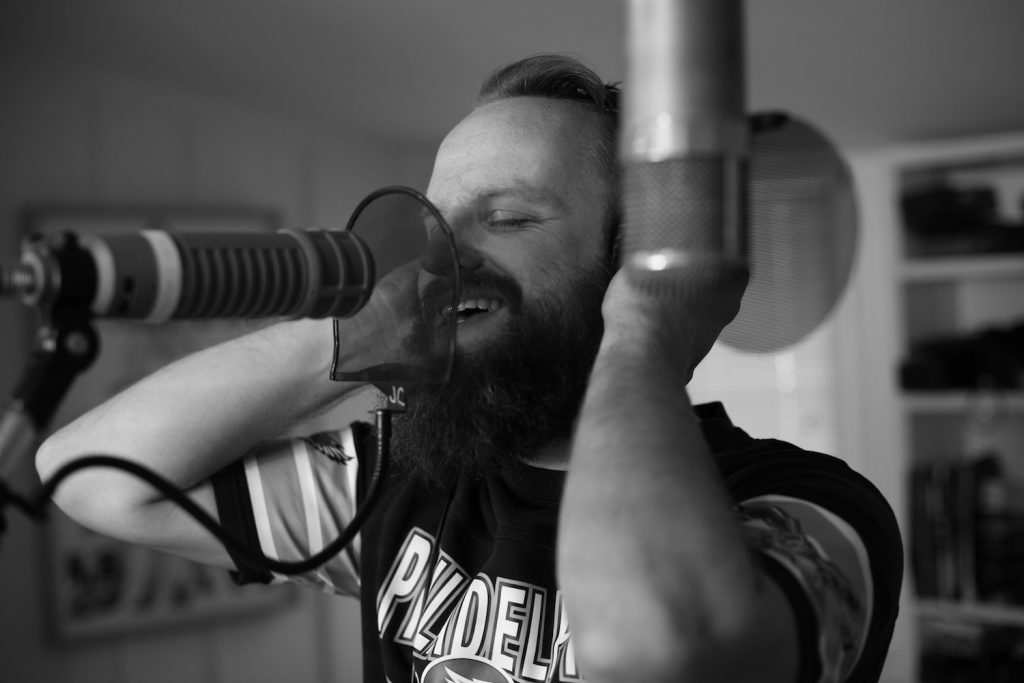
Dan Campbell laying some vocals down for Sister Cities // By Megan Thompson
“I was hanging out in the tour bus,” Campbell says, “And I had this moment where I thought to myself, ‘What if we could make something bigger than just music? What if it could be multidimensional or multifaceted?’ I didn’t know what the moment would look like, or what we’d even be writing about, but I was like, ‘What if when you put the record on, you could open a book and actually see the things we’re singing about, or read a journal about it?’
The book came at an important time for the band, too. Campbell explains, “We’re on our sixth record now, so we had to ask ourselves, ‘How can we find ways to make our music even more interesting? How can we push ourselves outwards?’ I thought the book would be a great way to do that; to add a few more layers to the record. You can still listen to the album on Spotify or Apple Music if you want to, but you can also do it in a different way—a way where the record is tangible and it has this depth that you can’t get just by listening to it.”
At the risk of sounding like a dinosaur at 21, it’s reminiscent of the way people used to enjoy music in the good ol’ days. Up until the late aughts, smartphones weren’t a commodity and the universal history of music wasn’t at our disposal 24/7. The common story is that every so often, you’d trek it down to your local record store, pick out the CD with the most striking artwork, then make an activity out of sitting down and soaking the record in. If you were lucky, the most recent issue of Blunt (RIP) had a feature about the record, so you could learn a little more about it as you jammed the sweet tunes … Kind of like what The Wonder Years are doing now.
“I would love it if that’s how people experienced this record,” Campbell says, “But I mean, I’d also love it if you just listened to it at all. If you just want to open Spotify and jam the songs while you make dinner, that’s amazing. Do that! But y’know, if you want to spend the time to open up the book and read through it and look at the photos while you’re listening, you can do that too. I think that’s a rewarding experience.”
It goes without saying that between the book and the lyrics on the album itself, Sister Cities is The Wonder Years’ most personal offering thus far. There’s no smoke and/or mirrors to shield Campbell from the world on LP6, and especially with the journal entries nestled in that book, fans can expect to see a whole new side of the 31-year-old.
Like, there’s the record that is artistically satisfying, and the record that will be commercially satisfying—the record that you want to make versus the record that your fans want you to make—and I don’t think those things are diametrically opposed.
[ Dan Campbell ]
“There were things that I had to look through and go, ‘Am I comfortable sharing this?’ But for the sake of the piece feeling complete and serving it in the right way,” Campbell assures us, “We didn’t want to hold back with too much.”
As someone who’s been vocal about his battles with anxiety in the past, it’s understandable that delivering such an honest and uncensored peek into the band would be a tad daunting for Campbell.
“It’s a little scary, for sure,” he says, “But I mean, everything we do is scary because we’re constantly opening ourselves up to criticism, and I don’t handle that super well. I like when people like me! I don’t like when they don’t! I’m very sensitive [laughs]. Even when I tweet about my favourite football team and someone says, ‘Your team fucking sucks! My team’s the best and I hope you fucking die,’ that sucks! People are mean [laughs]. So when you put your whole heart into something and say, ‘Here, please have this, I made it for you and I love it and I’m proud of it,’ and someone says, ‘Eh, it fucking sucks,’ it hurts! I’m not going to pretend that it doesn’t.”
Thankfully, it seems Campbell won’t have much to worry about when it comes to the critics: Sister Cities has been out for only a few days, and it’s already received universal acclaim from fans and critics alike (Hysteria gave it a 9/10, in case you were wondering). Campbell is his own biggest critic, though, so there’s only one review that matters in the end …
“I don’t know where it becomes unseemly to speak about your own record positively, but it’s not even close for me,” Campbell says excitedly. “[Sister Cities is] just so much better of a record than anything we’ve ever made before. I’m nervous about how that might read in print, but in true honestly, I’m just so fucking proud of it, man! And it’s not to say that I’m not proud of the other stuff—I understand why people might say, ‘Well, my favourite record is The Upsides’ or, ‘I think The Greatest Generation is their best work,’ because I understand what it’s like, as a music fan, to be emotionally connected to a record and have it speak to me at a certain time in my life. But I don’t think that means we can’t strive to keep making better records. I mean, Jesus, we’re trying to make better records! How do you argue with that!?”
If there is one notable trend in the limited criticism we’ve seen aimed at Sister Cities, it’s from longtime fans that feel shorted by the musical evolution on display. The Wonder Years are no longer an opaque pop-punk band, and some comment section dwellers are downright shitting their britches over it. But the band’s shift in style hasn’t been at the hands of some major label conspiracy to put The Wonder Years on the radio—Campbell notes that Hopeless Records A&R have no infliction on the band’s sound—and if anything, the record sees them shift even further away from that marketable boyishness they once delved so joyfully into.
“I think that there’s this misconception that records operate in a binary,” Campbell says. “Like, there’s the record that is artistically satisfying, and the record that will be commercially satisfying—the record that you want to make versus the record that your fans want you to make—and I don’t think those things are diametrically opposed. I think we’ve always been able to find a record that was both interesting and artistically satisfying for us, but didn’t leave our fans going, ‘What happened to the band I loved?’ And again, that comes from being a fan of music and knowing what it’s like to feel abandoned by an artist, but also knowing what it’s like to be patronised by an artist, where I’m like, ‘This is the same record you made last time. You don’t think I’m smart enough to grow with you.’ We don’t want to be that kind of band.”
With its members now shifting into their 30s, it should come as no shock that Sister Cities is a markedly more mature album from The Wonder Years. It feels like a natural step further into the stark and sober commotion they tapped into on No Closer To Heaven, which Campbell says was the band’s exact objective.
“Whenever we go to make a record, we have a few goals,” he explains. “We need to make sure that we can, with all certainty, say, ‘This is the best record we’ve ever written.’ And if we’re not at that point, then we’re not ready to record, so we’ll go back and keep working on it. The other thing we want to do is say, ‘Let’s not stagnate, let’s not give you the same record over and over and over again.’ Y’know, we don’t want to totally switch genres on you, but we want to take one step forward with every record—a step away from where we were and into somewhere new. Looking back at No Closer To Heaven, I don’t think we took that one whole step; I think we took three quarters of a step. I think we owed you a quarter of a step, so when it came time to start working on Sister Cities, we took the one step that we always want to take, but then we took that extra quarter.”
At its core, I think what makes this record phenomenal, in opposition to our earlier work, is that it’s more dynamic.
[ Dan Campbell ]
In taking that extra step forward, the band ventured to make Sister Cities their most premeditated effort yet. They’d written and rehearsed every song a hundred times over before stepping into the studio, and, curiously enough, studied their past last five albums for inspiration.
“With every new record we make, we realise what we could be doing better,” Campbell says. “There’s a lot of self-reflection—saying, ‘Okay, maybe the last record was a bit too verbose,’ or, ‘Maybe we need to slim down the tracklist. At its core, I think what makes this record phenomenal, in opposition to our earlier work, is that it’s more dynamic. In the writing process, we could get to points in songs and say, ‘Well normally, here, we would do this thing—this is the thing that we always go at this moment in a song.’ But this time around, we’d say, ‘Well, let’s not do that. Let’s work a little harder on it and see if there’s a better thing we can do.’ And so we would stop doing things on impulse and just kind of explore where we could go with a song.”
The band were also in a much better position than they were at the turn of their last few album cycles.
“We had a dedicated writing space this time,” Campbell beams. “It wasn’t an abandoned building like it was for the last two records, so we actually didn’t mind being there. And we had set up this whole new rig so we could really hear each other, and hear ourselves. We could also demo in realtime, so we’d be like, ‘Oh, I really like how this sounds—let’s track it, right now!’ And then we could go home and listen to it right away. I’d have the songs an hour after practise, so I could listen to them all night and come back and go, ‘Hey, you know what we did here? We could do that better.’ And so the songs went through a lot more changes and iterations, which allowed us to push ourselves a lot more in every space that we could.”
Between their dedicated writing space, more time for messing around and all the photos and journals that chronicled their last tour, Campbell was buzzing with creative energy. It was a refreshing change for the songwriter, whose battle with writer’s block penning No Closer To Heaven was famously documented.
“It was the exact opposite this time,” Campbell asserts with a sigh of relief. “It was like the faucet got turned on, and all I could do was write! But all I was writing were the bones of a song, and we took a long time to put the meat on those bones as a band. But it took a long time on purpose. The ideas were there, but the song wouldn’t done for weeks because we kept saying, ‘This could be better. This could be more interesting. Let’s push this a little further. We have the whole song done? Cool, let’s scrap it, go back to step one and build it in a whole different way to see if that’s more interesting.’”
Looking to the future, Campbell is excited to keep pushing The Wonder Years in new directions. LP7 is obviously still a ways away from even its earliest stages, but given the success the band had with their newfound tactic of documenting life in realtime, we’re happy to hear they plan on continuing it when they hit the UK for the first leg of the Sister Cities tour.
“The Christmas before we did the European tour, my wife bought me this camera that I had been pining for since forever,” Campbell says. “I’m definitely no photographer, but I’m trying to learn, so I’m going to bring that camera with me everywhere we go. And I think journalling tours has helped me as a writer, so I’m going to be doing more of that as well. I don’t know if we’ll ever make a Sister Cities 2, but y’know, just by a natural extrapolation of the fact that I want to be taking more photos and I want to be writing more, we’re going to end up documenting things by accident.”
There’s plenty to document, too, with the band showing no signs of slowing down soon. “There’s always more exploring and travelling and meeting people and experiencing cultures that we want to do,” Campbell rhapsodises. “There are many more places that we’d love to visit, and some of them are as close to you as Tasmania—we’d really like to go to Tasmania! We really want to see Malaysia and Indonesia and China, Africa, Scandinavia … Y’know, we’ve been to Mexico, but we’ve never played Mexico City! There are so many places we want to go and so many people we want to meet, so hopefully the journey is not even close to over.”


